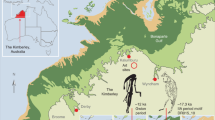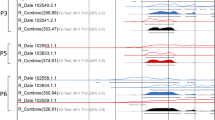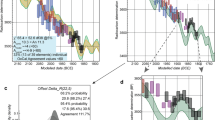Abstract
A NUMBER of parchment manuscripts of known historial age, from the period of the Renaissance, have been measured by the radiocarbon method to assess the feasibility and accuracy with which such documents can be dated. This study was also intended to check the veracity of secular variations in the radiocarbon content of the biosphere with animal rather than tree ring tissue.
This is a preview of subscription content, access via your institution
Access options
Subscribe to this journal
Receive 51 print issues and online access
$199.00 per year
only $3.90 per issue
Buy this article
- Purchase on Springer Link
- Instant access to full article PDF
Prices may be subject to local taxes which are calculated during checkout
Similar content being viewed by others
References
Libby, W. F., Radiocarbon Dating, 84 (University of Chicago Press, 1952).
Saxl, H., thesis, Univ. Leeds (1954).
Berger, R., Scientific Methods in Medieval Archaeology, 89 (University of California Press, Berkeley/Los Angeles, 1970).
Suess, H. E., J. Geophys. Res., 70, 5937 (1965).
Berger, R., Giertz, V., and Horn, W., J. Architect. Historians (in the press).
Author information
Authors and Affiliations
Rights and permissions
About this article
Cite this article
BERGER, R., EVANS, N., ABELL, J. et al. Radiocarbon Dating of Parchment. Nature 235, 160–161 (1972). https://doi.org/10.1038/235160a0
Received:
Revised:
Issue Date:
DOI: https://doi.org/10.1038/235160a0
This article is cited by
-
Genuine or forged? Assessing the authenticity of a confiscated manuscript using radiocarbon dating and archaeometric techniques
Archaeological and Anthropological Sciences (2017)
Comments
By submitting a comment you agree to abide by our Terms and Community Guidelines. If you find something abusive or that does not comply with our terms or guidelines please flag it as inappropriate.



